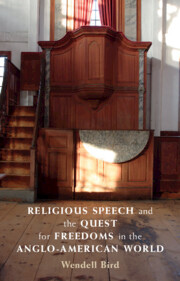Book contents
- Religious Speech and the Quest for Freedoms in the Anglo-American World
- Reviews
- Religious Speech and the Quest for Freedoms in the Anglo-American World
- Copyright page
- Dedication
- Contents
- Figures
- Abbreviations
- Introduction
- 1 The Legacy of Freedom of Speech
- 2 The Legacy of Freedom of Press
- 3 The Legacy of Freedoms for the Criminally Accused
- 4 The Legacy of Higher Education
- 5 The Legacy of Abolition of Slavery
- 6 The Legacy of the Modern Civil Rights Movement
- Epilogue
- Acknowledgments
- Select Bibliography
- Index
5 - The Legacy of Abolition of Slavery
Published online by Cambridge University Press: 13 April 2023
- Religious Speech and the Quest for Freedoms in the Anglo-American World
- Reviews
- Religious Speech and the Quest for Freedoms in the Anglo-American World
- Copyright page
- Dedication
- Contents
- Figures
- Abbreviations
- Introduction
- 1 The Legacy of Freedom of Speech
- 2 The Legacy of Freedom of Press
- 3 The Legacy of Freedoms for the Criminally Accused
- 4 The Legacy of Higher Education
- 5 The Legacy of Abolition of Slavery
- 6 The Legacy of the Modern Civil Rights Movement
- Epilogue
- Acknowledgments
- Select Bibliography
- Index
Summary
The abolition movement in Britain and America was primarily led and supported by people driven by Judeo-Christian religious beliefs. The major role of Quakers before 1800 is generally acknowledged. However, "[m]ost recent assessments neglect, avoid, or dismiss the Evangelicals," one scholar noted, and their much greater role after Quaker efforts faded after 1800. By contrast, the prior generation of historians typically concluded that the "evangelical roots of radical abolition are well documented"; "the abolition movement grew out of evangelical Protestantism"; and "[t]here is no question of the importance of Evangelicalism in American anti-slavery." Quakers and Evangelicals publicized the horrors of slavery, and condemned slavery theologically as sin, while building on the revolutionary generation’s widespread discomfort with slavery, and achieving steps toward gradual emancipation in the northern states. Evangelicals after 1800 broadened the movement, appealing to many of those claiming conversion in the Second Great Awakening, and supported immediate abolition. Though not every leader or supporter was primarily motivated by religious beliefs, a large number were, and Judeo-Christian faith was crucial in the abolition movement. Those activities of the abolition movement consisted largely of Judeo-Christian religious speech: sermons and oratory, tracts and circulars, antislavery newspapers and other publications, and petitions.
Keywords
- Type
- Chapter
- Information
- Publisher: Cambridge University PressPrint publication year: 2023

